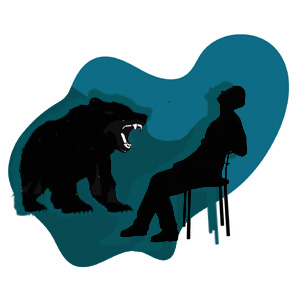Living with Depression & Anxiety?
Do not be anxious about anything, but in every situation, by prayer and petition, with thanksgiving, present your requests to God. ~ Philippians 4:6
More and more, I see people suffering from mental health challenges like depression, anxiety, and identity crises. It saddens me to witness individuals relying heavily on medication, spending significant sums on therapy, and living disengaged, disconnected lives. While I recognize that some genuinely need medication due to chemical imbalances, I worry about those whose deeper need may be spiritual rather than clinical. The tragedy is that the problem—and its solution—are often clear if we're willing to face them.

I once heard a story at church about a young boy who found a bear cub and brought it home. When he asked his parents if he could keep it, they agreed. The boy kept the cub in his room, feeding and caring for it. Over time, he grew deeply attached.
But as the cub matured, it became enormous and dangerous. The boy had to chain the door shut, unlocking it only to feed the bear. Each time, the bear lashed out, clawing at him and leaving deep wounds. When his mother finally asked, “Why don’t you just get rid of the bear?” the boy replied, “But I love him.”
That story has stuck with me because it offers a powerful lesson. We often nurture the very things that hurt us—emotional habits, thought patterns, or desires—that grow into monsters. Over time, we become so attached to them that we’re unwilling to let go, even as they wound us.
Like the bear, we all have a monster inside us. The Bible calls it our flesh—our sinful nature. To learn more about this, you can read the section titled “The Monster Inside of Us.”
This monster seeks independence. It wants to carve its own path, build its own kingdom, and live free from God. It sees God as a threat to its autonomy. It is selfish, prideful, and always hungry for more.
It’s an egomaniac demanding constant attention. Its motto is “I want”—love, comfort, meaning, happiness, pleasure. It’s opinionated, childish, unforgiving, and self-protective at all costs. It wants everything, no matter the consequences.
Many people learn to manage this monster by either constantly feeding it or trying to ignore it. But this only leads to a shallow, restless existence—caught between fleeting highs and devastating lows.
For others, the monster becomes too much to handle. The pressure to satisfy or suppress it becomes overwhelming. That internal struggle often surfaces as depression, anxiety, or a fractured sense of identity. In trying to tame it, we become consumed by it. And yet, the monster never sleeps. It leaves us exhausted, confused, and empty.
God asks us the same question the boy’s mother asked: Why don’t you let go of the monster? And like the boy, our answer is often: “But I love him.” We’ve grown so attached to our desires, our image, our way of doing life—even when it’s destroying us—that we hesitate to surrender.
Is it wrong to love ourselves?
In this way, yes. Because what we’re really doing isn’t love—it’s enabling. We’re nurturing something broken inside us, hoping it will one day bring us peace.
But our idea of love is distorted by the very nature of the monster. Its selfishness blocks our ability to love others properly, because it's too busy chasing its own satisfaction.
God teaches us how to love by loving us first. He reveals who we really are and shows us what pure love looks like—unconditional, unselfish, and rooted in truth. God needs nothing from us, which makes His love the most trustworthy foundation for our lives.
Trying to love ourselves apart from God is at the heart of the human problem. It’s been this way since Adam and Eve. When we let the monster rule, we separate ourselves from the One who can actually heal us—from the inside out.
Without God, we tend to swing between arrogance and self-loathing. We either put ourselves on a pedestal or tear ourselves down for never being enough. It’s a painful and exhausting way to live.
But when we see ourselves through God’s eyes, everything changes. He loves us despite our flaws, our past, our failures.
I remember my father being critical of nearly everything I did. If I painted the house, he’d find every flaw, no matter how hard I tried. But God isn't like that. He sees the heart—He sees the effort, the intent, the longing behind our actions. His love corrects, but it never condemns.
Human love is tangled in fear, judgment, and limitation. God’s love is different. It sets us free.
When we build a relationship with Him, the grip of the monster loosens. We find peace, healing, and clarity. The depression, anxiety, and confusion that once defined us begin to lose their power.
Who you are, what you were made for, and how you were meant to live can only be discovered in Him. When you find that, you’ll be standing on solid ground. Without Him, you're left on sinking sand—adrift, vulnerable, and longing for a peace only God can give.








